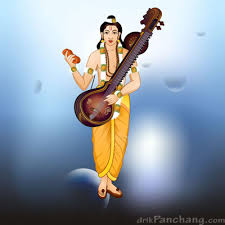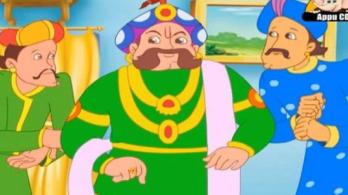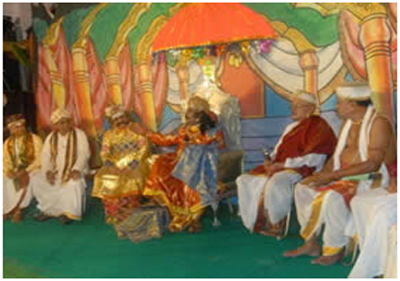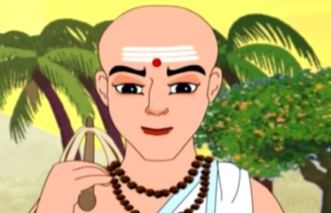It’s Tenali Raman Again
January 17, 2016 8 Comments
Part 1
The orrargal (eyes and ears of the court) brought back news of wide-spread commotion in the city and its near-about.
Small knots of people collected at street corners, in front of shops, temples, under the trees…and speculating in hushed voices:
‘Someone must have spoken ill of the Gods and the Devas (demi-gods). This will not go unpunished…’
‘May be such blatant and cruel lies were being said against the good that even the Gods wouldn’t hear…’
‘Some evil plans being hatched? Surely we’re going to see some anartham (unthinkable) happening in the days to come…’
…
At the request of his ministers, Krishnadeva Raya assembled the court in great haste to deal with the situation. His Prime-minister Timmarasa was away leaving it to a stand-in.
‘Bavanna, have we been able to find out what is this all about?’
‘Yes, my lord, the udhyavanam (a large tended park) in the northern outskirts where we camp in summer…’
‘I know, the place lush with trees and plants…a pretty isolated spot, I thought. So what happened there?’
’My lord, that’s where it happened.’
‘And what happened there? You’re making me repeat myself.’
‘There is an old shrine out there for Sage Narada. A priest from the neighboring village comes every morning to perform the daily pooja; after he is done he locks up the shrine and goes away. Being a little out of the way, the shrine has very few visitors.’
‘Please get to the point.’
‘Yes, my lord. This morning when the priest opened the shrine he found…’
‘What? Were the ornaments stolen? The brass bell went missing?’
‘No, my lord, it’s worse. In this shrine, as customary, the murthy (icon, statue) showed the sage standing erect and front-facing, playing the Mahathi (stringed Veena uniquely attributed to the sage) and carrying khartal in his hands. And today the hands of the icon were lifted up as if to plug his ears. The icon did not appear to be vandalized…no tool marks anywhere. The sage seems to have lifted his hands of his own volition.’

‘Obviously the priest was not in his senses or his sight was poor.’
‘No, my lord. I had it checked up subsequently with our own officers going out there. The reports are true.’
There was no interruption from the pensive King.
‘Our folks are very disturbed at this strange happening. They view it as a sure heaven-sent signal of some imminent calamity to befall us. Unless we do something about it in quick time…’
Part 2
The vexed King looked to his officers of the court for some explanations, solutions or suggestions.
‘I think we should immediately dismantle the shrine completely from there. The public memory is short. It’ll all be forgotten soon.’
‘No, this has already made a deep impression on our folks. Won’t be easily forgotten.’
‘We could claim we had arranged for a sculptor to install a new icon in place of the old one that was showing its age.’
‘Won’t wash – what if they ask you why sneak in an icon overnight and striking that unusual pose?’
‘Could be that the sculptor hid a secret feature we didn’t know about in the statue that got triggered somehow.’
‘It might be best to gracefully accept the sage is upset with us for some reason. Let’s call our jyotish’s (astrologers) and acharya’s (guru’s), check with them what prayaschittam’s (acts/rituals seeking forgiveness) are required to please the gods.’
…
These and other ideas that followed did not satisfy the King.

Breaking the silence: ‘My lord, perhaps Raman can help us in this matter?’ hazarded an officer not missing an opportunity to get the former into trouble with the King.
It was the only suggestion that appealed to the King. Tenali Raman had on many occasions in the past saved the day for Raya and the Kingdom.
So a royal missive was immediately dispatched to Raman asking him to accompany the messenger and appear before the court right away.
It was a short wait before Raman arrived. The King asked Bavanna to apprise him on the developments so far.
Part 3

‘So, Raman, what do you have to say? We’re eager to hear you.’
‘My lord, very strange indeed. And no wonder it has caused so much panic among our people. But there’s very little else useful to be said standing here. I would like to proceed to the shrine and see things for myself. I’ll report to you, my lord, as soon as I’ve some something significant.’
That was last of Raman seen or heard in the day.
In fact many officers in the King’s court were sure they had gotten rid of Raman for good.
The King retired for the night, at once furious at the lack of communication and concerned for Raman’s safety as forces of an unknown kind seemed to be at play here. It was a night of disturbed sleep for him.
Next morning, as a grouchy and groggy King emerged from his quarters, he was cheerfully greeted by Bavanna.
‘Has Raman come back?’ inquired the anxious King.
‘No sign of him yet, my lord.’
‘Then what’re you grinning about?’
‘My lord, it is good news. Filled with apprehension on what anartham was he to witness today, the priest opened the shrine this morning. And, lo, what does he behold? The sage – he had resumed his normal pose! Like as before. The problem and the panic gone! Life this morning is as usual all over the city.
‘I knew Raman would fix it. So what did he do?’
‘No, my lord, it doesn’t appear Raman had anything to do with it. In fact he is not traceable at all. And frankly we’ve no clue how the sage went back to his original stance. Yes, my lord, for many of us questions of what, why and how still linger on the entire episode. But we’re happy the population at large has gone back to work.’
‘I keep telling you wise guys the entire incident is the product of someone’s rich imagination.’
‘No, my lord, the incident did happen. I can personally vouch for it,’ said a haggard looking Raman, making his way to the King’s presence.
A surprised King inquired: ‘What have you done with yourself, Raman? Did you fight with a storm or ride a rogue elephant? And where have you been? Bavanna here says you never got in touch with us.’
‘Bavanna is right, my lord. But I returned later than midnight and crashed out of sheer exhaustion. I got up only a little while ago and dragged myself here right away. Pardon my disheveled look, my lord.’
‘So what were you up to since you left the court yesterday morning? Did you know the sage has gone back to his normal pose?’
‘Yes, I know, my lord. But it wasn’t easy persuading him.’
‘What? You persuaded him?’
‘No, my lord. I must correct myself – it was actually quite easy to persuade the sage, but it wasn’t to find the buttons to push.’
‘What are you blabbering? Would you like to rest for a while and then talk?’
‘No, I’m quite alright, my lord. It’s a long story’.
Part 4
Raman’s story:

He proceeded from the King’s court and reached the shrine by mid-day. The small shrine was predictably locked. But he could see the sage in his strange pose through a window on the side that was not shuttered firmly.
In all the time he was there he could see no visitors or even passers-by.
Finally he sat on the stone platform – a two-feet wide granite slab resting on a pair of low pedestals – laid out on one side of the front courtyard. Tired he was, he forced himself to think about what next. That’s when he observed a train of ants heading to a spot on the far side of the platform. It was a few spilled grains of cooked rice that were attracting the ants. It meant a visitor who had had his food at the spot. Who would it be? May be he could throw some light. But there wasn’t anyone in the vicinity to ask.
He entered the udhyavanam next to the shrine and made a thorough search covering every nook and corner. His efforts were rewarded when he located the caretaker in his cabin. He was an old man bent with age, failing eye-sight and hard of hearing. How he performed his duties was a wonder. Through gestures he confirmed there were hardly any visitors except for the priest in the morning. However – this was the interesting part – last couple of nights he saw a youngster sitting in the courtyard and in the morning there was no sign of him. As to what the young man was doing he couldn’t say. Obviously the old man did not have the strength at the end of the day to go all the way to the shrine and check. As far as he was concerned, it was better this way – the youngster in the shrine rather than in the udhyavanam.
Again there was no easy way to find out who this youngster was and why did he come to the shrine at late hours. It would be best, Raman thought, to stay back at the shrine and watch it first hand. Hopefully the lad would turn up this night too. He borrowed a lamp and a few minimum accessories from the old man and set himself up for the night.
The sun went down. It was a signal for the nocturnal insects winged and not-winged to come out. Raman had a tough time keeping the buzz out of the body orifices. Before long a small dot of light suddenly appeared at a distance. Raman’s hear-beat went on high throttle. Once it was clear the light was coming towards where he was he extinguished his lamp not to scare off the visitor. When the figure got closer, he saw it to be a young lad carrying a bag and a lamp entering the courtyard. Raman hurriedly hid himself behind a tree.
The lad settled himself on the stone platform, cleared his throat and launched into a loud unrestrained exercise of his vocal chords.
Two things became instantly clear to Raman: a) why did the lad come to this isolated spot for his sadhana (practice). No village would let him to do within miles and b) why the poor sage did what he did.
It was the most besur (discordant) outpouring Raman had ever heard, more like a goat in the process of its throat being slit.
Mystery uncovered, Raman quickly came out of his hiding reassuring the startled lad he meant no harm. Taking pity on him, Raman spent a few hours teaching him basics of voice and tone control. It was near midnight when they finally parted.
It took a while for the King and Bavanna to return to the present.
The King inquired: ‘How did the sage go back on his stance?’
‘Well, I advised the self-taught youngster to seek the tutelage of a good guru. And cautioned him against returning to the shrine lest he attract the ire of the royal court. That should keep him away for good. Next, through the window on the side I spoke to the sage reassuring him now he was safe from the lad. And in return I requested him to assume his earlier form. Or else…I didn’t think it was necessary for me spell it out.’
Tenali Raman had done it again. Much to the chagrin of his detractors his stock in the court went up by a few notches.
End
Wiki: The Vijayanagara Empire (also called Karnata Empire and the Kingdom of Bisnegar by the Portuguese) was an empire based in South India, in the Deccan Plateau region. It was established in 1336 by Harihara and his brother Bukka Raya I of Sangama Dynasty. The empire rose to prominence as a culmination of attempts by the southern powers to ward off Islamic invasions by the end of the 13th century. It lasted until 1646 although its power declined after a major military defeat in 1565 by the Deccan sultanates. The empire is named after its capital city of Vijayanagara, whose ruins surround present day Hampi, now a World Heritage Site in Karnataka, India. The empire reached its peak during the rule of Krishnadeva Raya (1509–1529) when Vijayanagara armies were consistently victorious. The empire annexed areas formerly under the Sultanates in the northern Deccan and the territories in the eastern Deccan, including Kalinga, while simultaneously maintaining control over all its subordinates in the south. Many important monuments were either completed or commissioned during the time of Krishnadeva Raya.
Tenali Ramakrishna, who was known as Vikatakavi (jester poet), was a Telugu poet who hailed from the present-day Andhra Pradesh region, generally known for his wit and humor. He was one of the Ashtadiggajas or the eight poets at the court of Krishnadeva Raya.
Source: Adapted from Dhina Thanthi
Images from bhagavatam-katha.com, tagc.org, dailymotion.com and topyaps.com

Excellent. Waiting for the next story 🙂
LikeLiked by 1 person
Thanks, Harishri. Glad u liked it. Wasn’t sure how will it go.
LikeLike
Me too!
LikeLiked by 1 person
Thank you.
LikeLike
Great Raghu!
More such stories please !
LikeLiked by 1 person
amazing story Raghu. he was a genius.
LikeLiked by 1 person
Very interesting story Only you can write such beautiful stories but tell me whether the incident narrated in the story is real or is it your own story ? Quite often historians write their own stories and probably the word History is slang for His (their own ) Story !
LikeLiked by 1 person
Apocryphal? Yes, I too liked it. It is built up on what appeared in Dina Thanthi friday supplement. It has these chotu stories, some of them nice and unheard of. I’ve duly credited https://widgets.wp.com/notifications/2318001502#the source at the end. Thanks.
LikeLike